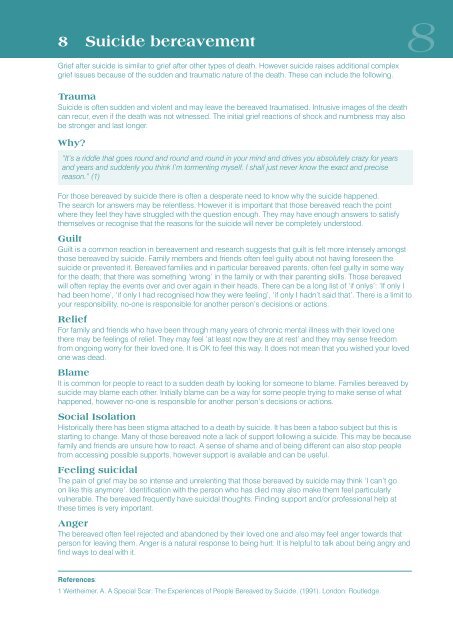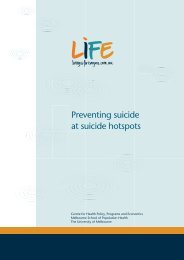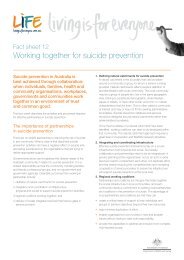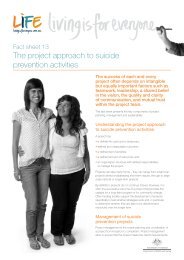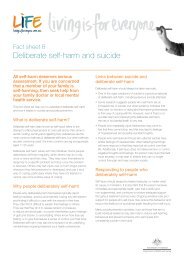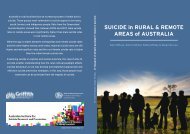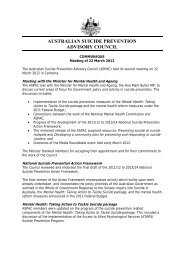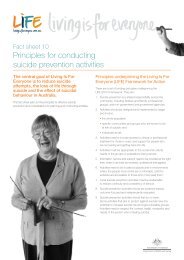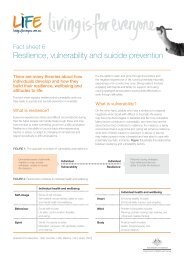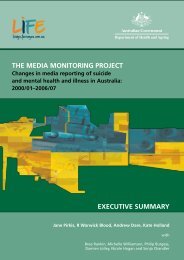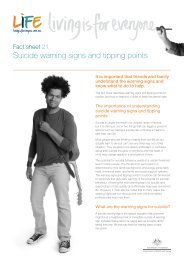Information & Support pack ACT - Living is for Everyone
Information & Support pack ACT - Living is for Everyone
Information & Support pack ACT - Living is for Everyone
You also want an ePaper? Increase the reach of your titles
YUMPU automatically turns print PDFs into web optimized ePapers that Google loves.
8 Suicide bereavement8Grief after suicide <strong>is</strong> similar to grief after other types of death. However suicide ra<strong>is</strong>es additional complexgrief <strong>is</strong>sues because of the sudden and traumatic nature of the death. These can include the following.TraumaSuicide <strong>is</strong> often sudden and violent and may leave the bereaved traumat<strong>is</strong>ed. Intrusive images of the deathcan recur, even if the death was not witnessed. The initial grief reactions of shock and numbness may alsobe stronger and last longer.Why?“It’s a riddle that goes round and round and round in your mind and drives you absolutely crazy <strong>for</strong> yearsand years and suddenly you think I’m tormenting myself. I shall just never know the exact and prec<strong>is</strong>ereason.” (1)For those bereaved by suicide there <strong>is</strong> often a desperate need to know why the suicide happened.The search <strong>for</strong> answers may be relentless. However it <strong>is</strong> important that those bereaved reach the pointwhere they feel they have struggled with the question enough. They may have enough answers to sat<strong>is</strong>fythemselves or recogn<strong>is</strong>e that the reasons <strong>for</strong> the suicide will never be completely understood.GuiltGuilt <strong>is</strong> a common reaction in bereavement and research suggests that guilt <strong>is</strong> felt more intensely amongstthose bereaved by suicide. Family members and friends often feel guilty about not having <strong>for</strong>eseen thesuicide or prevented it. Bereaved families and in particular bereaved parents, often feel guilty in some way<strong>for</strong> the death; that there was something ‘wrong’ in the family or with their parenting skills. Those bereavedwill often replay the events over and over again in their heads. There can be a long l<strong>is</strong>t of ‘if onlys’: ‘If only Ihad been home’, ‘if only I had recogn<strong>is</strong>ed how they were feeling’, ‘if only I hadn’t said that’. There <strong>is</strong> a limit toyour responsibility, no-one <strong>is</strong> responsible <strong>for</strong> another person’s dec<strong>is</strong>ions or actions.ReliefFor family and friends who have been through many years of chronic mental illness with their loved onethere may be feelings of relief. They may feel ‘at least now they are at rest’ and they may sense freedomfrom ongoing worry <strong>for</strong> their loved one. It <strong>is</strong> OK to feel th<strong>is</strong> way. It does not mean that you w<strong>is</strong>hed your lovedone was dead.BlameIt <strong>is</strong> common <strong>for</strong> people to react to a sudden death by looking <strong>for</strong> someone to blame. Families bereaved bysuicide may blame each other. Initially blame can be a way <strong>for</strong> some people trying to make sense of whathappened, however no-one <strong>is</strong> responsible <strong>for</strong> another person’s dec<strong>is</strong>ions or actions.Social IsolationH<strong>is</strong>torically there has been stigma attached to a death by suicide. It has been a taboo subject but th<strong>is</strong> <strong>is</strong>starting to change. Many of those bereaved note a lack of support following a suicide. Th<strong>is</strong> may be becausefamily and friends are unsure how to react. A sense of shame and of being different can also stop peoplefrom accessing possible supports, however support <strong>is</strong> available and can be useful.Feeling suicidalThe pain of grief may be so intense and unrelenting that those bereaved by suicide may think ‘I can’t goon like th<strong>is</strong> anymore’. Identification with the person who has died may also make them feel particularlyvulnerable. The bereaved frequently have suicidal thoughts. Finding support and/or professional help atthese times <strong>is</strong> very important.AngerThe bereaved often feel rejected and abandoned by their loved one and also may feel anger towards thatperson <strong>for</strong> leaving them. Anger <strong>is</strong> a natural response to being hurt. It <strong>is</strong> helpful to talk about being angry andfind ways to deal with it.References:1 Wertheimer, A. A Special Scar: The Experiences of People Bereaved by Suicide. (1991). London: Routledge.23


